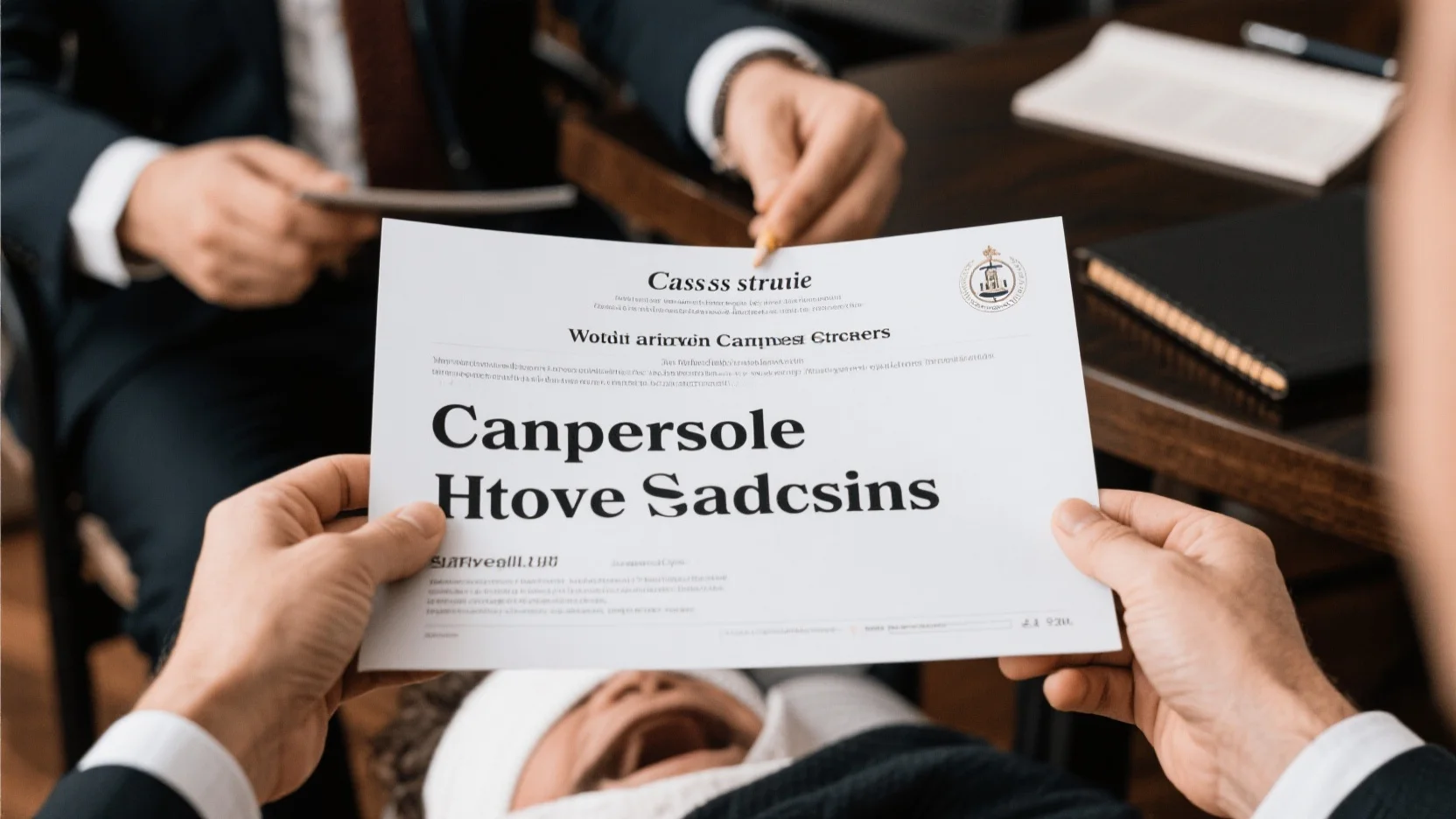
Image Source: pexels
Understanding what drives the success of high-value personal injury claims can transform lives, as highlighted in a Case Study Analysis of Successful High-Value Personal Injury Claims. These claims often provide victims with the financial resources needed to rebuild after devastating injuries. Legal expertise plays a pivotal role in this process by ensuring strong case preparation, leveraging expert testimony, and exploring every avenue for compensation.
Key Takeaways
- Good proof is key for big personal injury claims. Collect doctor reports, witness stories, and expert advice to make a strong case.
- Get legal help quickly. Talking to a lawyer soon after getting hurt can save proof and help you get fair payment.
- Stay calm during talks. Insurance companies might offer little money. A good lawyer can help you ask for more.
Overview of High-Value Personal Injury Claims
Definition and Characteristics of High-Value Claims
High-value personal injury claims stand out due to their significant financial stakes and the life-altering nature of the injuries involved. These claims often arise from catastrophic incidents that result in severe injuries or long-term medical needs. Several key characteristics define these cases:
- Substantial damages, including extensive medical expenses and loss of earning capacity.
- Complex legal and medical issues requiring expert analysis.
- Aggressive tactics by insurance companies, such as disputing liability or offering low settlements early.
Victims in these cases face unique challenges. Insurance companies may delay the claims process or even conduct surveillance to undermine the claim. Strong legal representation becomes essential to counter these tactics and secure fair compensation.
Common Types of High-Value Personal Injury Cases
Certain types of personal injury cases frequently result in high-value claims. These include:
- Car accidents involving catastrophic injuries.
- Slip and fall cases leading to severe physical harm.
- Medical malpractice due to negligence by healthcare providers.
- Product liability cases involving defective or dangerous products.
- Workplace accidents causing permanent disabilities.
- Dog bites and intentional torts, such as assault or battery.
Each of these cases carries unique complexities, but they share the potential for significant financial recovery when handled effectively.
Importance of High-Value Claims for Victims
High-value personal injury claims play a critical role in helping victims rebuild their lives. They provide compensation for medical expenses, lost wages, and other damages, which are essential for financial recovery. Beyond the financial aspect, fair compensation alleviates stress and supports emotional recovery by reducing the burden of financial uncertainty. Skilled legal representation ensures victims receive the compensation they deserve, even when insurance companies attempt to minimize payouts.
Key Factors for Success
Importance of Strong Evidence
Strong evidence forms the backbone of any high-value personal injury claim. Medical records provide a detailed account of injuries, treatments, and future medical needs, establishing a clear link between the accident and the harm suffered. Witness statements add credibility by offering firsthand accounts of the incident or its aftermath. Expert opinions further strengthen the case by analyzing causation and liability, while photographs and videos visually document the scene, injuries, and property damage. Accident reports, created by law enforcement, serve as authoritative records of the event. Together, these elements create a compelling narrative that supports the victim’s claim.
Role of Expert Legal Representation
Expert legal representation significantly increases the chances of a successful outcome. Skilled attorneys enhance settlement values by negotiating effectively with insurance companies and presenting strong cases in court. Their experience allows them to anticipate challenges and navigate obstacles with precision. Proficient lawyers ensure every aspect of the claim is thoroughly examined, leaving no room for oversight. Victims benefit from their expertise, which often leads to higher compensation and a smoother claims process.
Effective Negotiation and Litigation Strategies
Negotiation and litigation strategies play a pivotal role in securing fair compensation. Attorneys with strong negotiation skills can counter lowball offers from insurance companies and push for settlements that reflect the true value of the claim. When negotiations fail, effective litigation strategies ensure the case is presented persuasively in court. This dual approach maximizes the chances of achieving a favorable outcome.
Understanding the Role of Insurance Companies
Insurance companies often employ tactics to minimize payouts. They may dispute liability, downplay the severity of injuries, or offer quick, low settlements. Delaying the claims process and conducting surveillance are additional strategies used to pressure victims. Understanding these tactics helps claimants and their attorneys prepare countermeasures. By staying vigilant and relying on legal expertise, victims can navigate these challenges and secure the compensation they deserve.
Case Study Analysis of Successful High-Value Personal Injury Claims

Image Source: unsplash
Case Study 1: Medical Malpractice Claim Resulting in a $5 Million Settlement
A patient suffered permanent injuries due to a surgical error. The medical team failed to follow standard procedures, leading to severe complications. The victim’s attorney built a strong case by gathering detailed medical records and consulting expert witnesses. These experts testified about the deviation from accepted medical practices. The legal team also highlighted the long-term impact on the victim’s quality of life. After presenting compelling evidence, the case settled for $5 million, covering medical expenses, lost income, and pain and suffering.
Case Study 2: Catastrophic Car Accident Claim Leading to a $3 Million Payout
A distracted driver caused a multi-vehicle collision, leaving one victim with life-altering injuries. The victim’s legal team reconstructed the accident using traffic camera footage and witness statements. They demonstrated the driver’s negligence and the extent of the injuries. The insurance company initially offered a low settlement. However, the attorney’s negotiation skills secured a $3 million payout, ensuring the victim could afford ongoing medical care and rehabilitation.
Case Study 3: Workplace Injury Claim Securing a $2.5 Million Compensation
A construction worker fell from faulty scaffolding, resulting in permanent disability. The attorney proved the employer’s failure to maintain safe working conditions. Expert testimony and safety inspection reports strengthened the case. The legal team pursued compensation aggressively, achieving a $2.5 million settlement. This amount covered medical bills, lost wages, and future care costs.
Analysis of Common Success Factors Across Cases
Each case shared key success factors. Strong evidence, including expert testimony and detailed records, played a critical role. Skilled legal representation ensured effective negotiation and litigation strategies. Attorneys tailored their approach to the specifics of each case, maximizing compensation. These elements highlight the importance of thorough preparation in high-value claims.
Lessons Learned from Successful Claims
Importance of Early Legal Consultation
Early legal consultation plays a pivotal role in the success of high-value personal injury claims. Victims who seek legal advice promptly benefit in several ways:
- Preservation of Evidence: Lawyers help secure critical evidence, such as photos, medical records, and witness statements, before it is lost or forgotten.
- Accurate Documentation: Legal guidance ensures injuries and damages are documented thoroughly, strengthening the claim.
- Avoiding Pitfalls: Attorneys prevent common mistakes, like admitting fault, that could weaken the case.
- Stronger Strategy: Early involvement allows for a well-planned legal approach, increasing the likelihood of a favorable outcome.
- Maximizing Compensation: Lawyers assess the full value of the claim and negotiate effectively with insurance companies.
- Reducing Stress: Legal support provides clarity and alleviates the emotional burden during a challenging time.
Victims who act quickly often find themselves in a stronger position to secure fair compensation.
Building a Strong Case with Evidence and Experts
A compelling case relies on robust evidence and expert testimony. Expert witnesses clarify complex issues, such as medical conditions or accident reconstruction, making them understandable for a jury. Their insights challenge opposing arguments and enhance the credibility of the claim.
Strong evidence, such as detailed medical records, accident reports, and photographs, creates a persuasive narrative. When combined with expert testimony, this evidence can significantly influence the outcome of a case. Attorneys who prioritize building a solid foundation with these elements often achieve better results for their clients.
Patience and Persistence in Negotiations
Negotiating with insurance companies requires both patience and persistence. Insurers often employ tactics to delay or minimize payouts, testing the resolve of claimants. Skilled attorneys counter these strategies by remaining steadfast and pushing for settlements that reflect the true value of the claim.
Rushing to accept a low offer can leave victims undercompensated. Instead, a methodical approach, supported by strong evidence and expert opinions, ensures fair compensation. Persistence often leads to better outcomes, even when negotiations seem challenging.
Tailoring Strategies to the Specifics of Each Case
Every personal injury case is unique, and tailored strategies are essential for success. Thorough investigations uncover key evidence, such as safety violations or negligence, that might otherwise go unnoticed. Attorneys who adapt their approach to the specifics of the case can accurately assess damages, including lost wages and emotional distress.
Tailored strategies also involve understanding how injuries impact the victim’s quality of life. This insight helps determine appropriate compensation. Incorporating expert witnesses further strengthens the case, providing authoritative support for the victim’s claims. By customizing their approach, attorneys maximize the chances of securing the best possible outcome.
High-value personal injury claims succeed when critical factors align. The table below highlights these elements:
| Factor | Description |
|---|---|
| Severity of Injuries | Serious injuries with long-term effects increase compensation potential. |
| Liability & Fault | Clear evidence of negligence strengthens the case. |
| Documentation & Evidence | Photos, medical records, and detailed documentation enhance credibility. |
| Long-Term Effects of Injuries | Chronic pain or permanent disability justifies higher damages. |
| Legal Representation | Skilled attorneys negotiate effectively and present strong cases. |
To protect their rights and secure fair compensation, individuals should follow these steps:
- Seek immediate medical attention.
- Preserve evidence like photos and witness details.
- Consult a personal injury lawyer.
- Avoid speaking with insurers without legal guidance.
- File claims promptly to meet deadlines.
Taking proactive measures ensures victims receive the justice they deserve.
FAQ
What should victims do immediately after an injury?
Victims should prioritize medical attention and document their injuries. They must preserve evidence, such as photos and witness details, and consult a personal injury attorney promptly.
How can legal representation improve claim outcomes?
Experienced attorneys negotiate assertively with insurers, build strong cases, and ensure victims receive fair compensation. Their expertise often leads to higher settlements and smoother claim processes.
Why is early evidence collection crucial?
Early evidence collection strengthens claims by preserving critical details. Photos, medical records, and witness statements provide undeniable proof, increasing the likelihood of a favorable outcome.
Tip: Acting quickly after an injury ensures stronger claims and better results.


